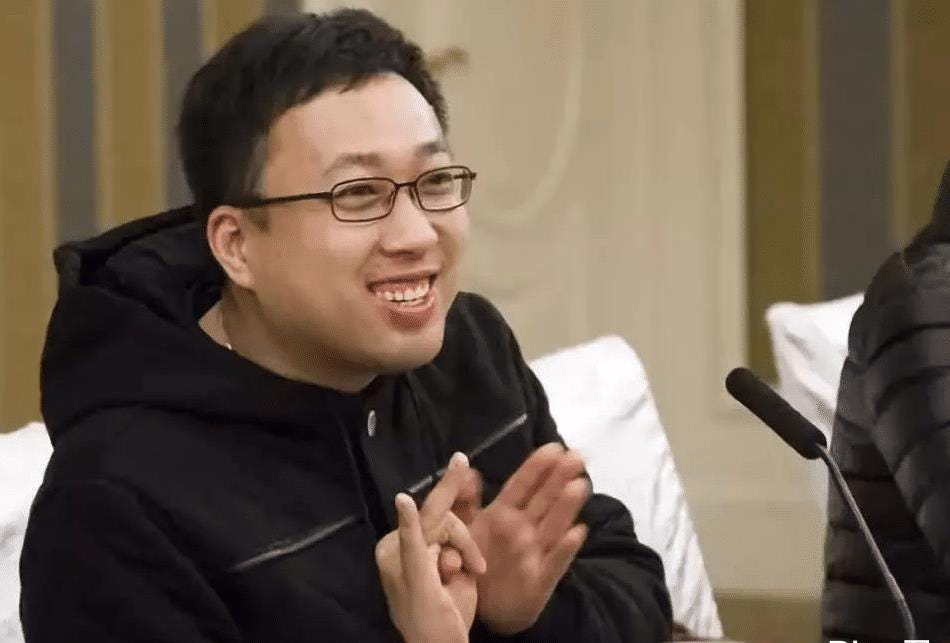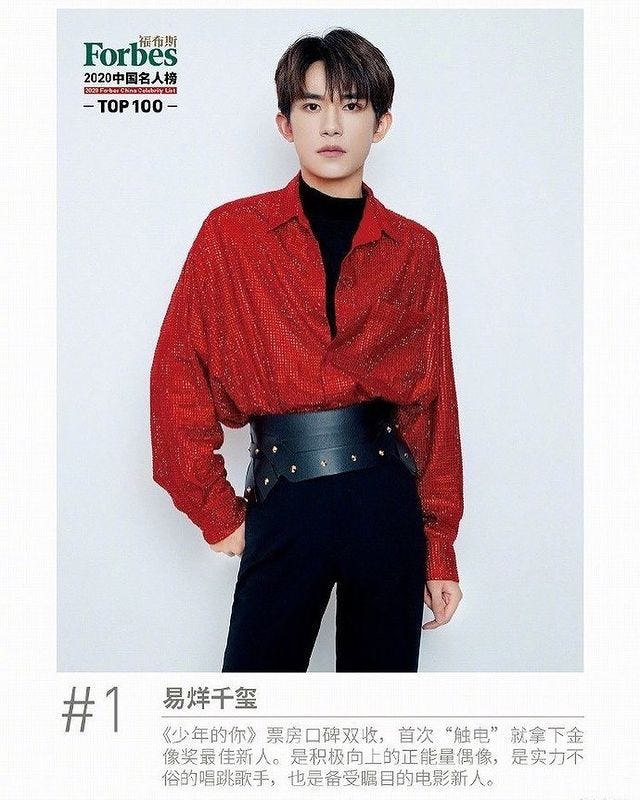C-Pop Update: Kris Wu's Goose
Also: A deep dive on “female-centric” TV, the September music chart update, and a healthy 吃瓜-worthy dose of celebrity drama.

💭 DEEP DIVE: 2020, The Year of “Female-Centric” Chinese TV
On September 4, idol competition show Sisters Who Make Waves (乘风破浪的姐姐 chéng fēng pò làng de jiějiě) aired its final episode. Like its other competitors in the highly popular (and, frankly, over-crowded) idol competition genre, Sisters followed a group of 30 “trainees” as they sang, danced, and competed for the opportunity to debut in a 7-member idol group. However, unlike its competitors, Sisters stood out because its contestants were not peppy, doe-eyed teenagers and early 20 year olds. Rather, the contestants were all older women whose ages ranged from 30 to 52 years old.
While many of these women were married with children, the show barely touched on their private lives as mothers and wives. For a Chinese show focused on older women, this was a rare and refreshing move. In addition, these talented “Sisters” were confident, sassy, and unafraid to buck social norms - and Chinese audiences loved it. When the first episode aired on June 12, the show surpassed one hundred million streams within just 10 hours of being released.
Here are the “Sisters” performing Kris Wu 吴亦凡’s iconic comeback song borne out of a meme, Big Bowl Thick Noodles (大碗宽面 dà wǎn kuān miàn):
And here’s an even ~spicier~ performance of KUN 蔡徐坤’s song, Lover (情人 qíngrén)… Watch to the end for some surprise pole dancing:
In addition to Sisters, a drama called Nothing But Thirty (三十而已 sānshí eryǐ) also attracted broad attention and online discussion. Unlike other popular dramas about young 20 year olds whose lives seemed to revolve entirely around unrealistic romantic relationships, Nothing But Thirty focused on women in their 30s. It had a more well-rounded view of its protagonists’ lives, and their male love interests were believable and imperfect.
It was so real, audiences raved. Viewers were especially enamored with one character named Gu Jia 顾佳 (played by 35 year old actress Tong Yao 童瑶), who was smart, classy, and fought back against those who wronged her. Despite being a full-time mother, Gu Jia was anything but a docile and passive stereotype. Thus, in a drama world dominated by female characters who were “dumb, fair, and sweet” (傻白甜 shǎ bái tián), Gu Jia and Nothing But Thirty felt like a fresh breath of air.
With shows like Sisters and Nothing But Thirty, many deemed 2020 to be the year of “female-centric” Chinese TV. But there’s reason to be skeptical about whether any of these shows truly indicate meaningful progress. While Nothing But Thirty started with a bang, its ratings tanked during the latter half of the series when Gu Jia appeared to not only forgive her cheating husband, but also sacrifice all of her assets to bail his troubled company out of debt. Viewers were disappointed - despite the promising setup and compelling characters, in the end Nothing But Thirty shared the same message as all the other dramas about “dumb, fair, and sweet” women: A woman’s top priority is to find a good husband and establish a harmonious family.
As for Sisters, while the idol competition show itself did not have the same messaging as Nothing But Thirty, one of its contestants did. While Sisters was still airing in late June, contestant Annie Yi 伊能静 found herself the subject of online ire when she declared in an interview that women should seek to find love before finding their self worth. Not doing so could result in a “tragedy” like Cantopop icon Anita Mui 梅艳芳, who, according to Yi, was pitifully unable to find love despite her successful career. The public backlash to these comments was severe (spoiler alert: she didn’t make it to the top 7 to debut from Sisters). While Yi later apologized, the incident revealed just how persistent such beliefs remain in modern Chinese society. Even for female celebrities, who are sometimes quite literally forced to not date for the sake of their careers, some still believe they cannot be happy without a good husband.

But the backlash against both these incidences shows that even if the media industry is behind, more and more modern audiences are rejecting these patriarchal beliefs. Even Sisters and Nothing But Thirty, however flawed, are small steps toward greater awareness of feminist issues in China. The staggering popularity of these shows has now awakened investors to the increasing demand for female protagonists with depth and ambition. As streaming platforms order more “female-centric” shows, perhaps screenwriters will take these incidences into consideration and adjust their scripts accordingly. 💭
🎵 MUSIC
September music chart update:
For the second month in a row, 飞鸟和禅 by 任然 (Rèn Rán) has maintained its #1 spot on the music charts. This singer is a bit of an enigma - she rarely shows up in the news and only has 700k followers on Weibo (for comparison, singer-songwriter Mao Buyi 毛不易 has 17.2m followers on Weibo). However, she’s produced a steady stream of hits in the last three years; one of her other songs 空空如也 dominated charts for a good part of 2018.
Jay Chou’s 晴天 is now #4. It’s amazing how long this song has managed to stay on the Chinese pop charts, despite being 17 years old. It’s probably safe to say that this song has gotta be China’s favorite Jay Chou song.
A new Douyin star is born: After her cover of 爱,存在 blew up on Douyin (Chinese TikTok) earlier this summer, internet singer 王靖雯不胖’s star began to rise. Her new song 不知所措 entered the charts this month at #2. Not much is known about 王靖雯不胖 (wángjìngwén bù pàng), but her stage name is quite unique - it translates to “Wang Jingwen is not chubby.” It’s difficult to tell from the English translation, but the tone of this stage name is more sassy than sad; it’s like defiantly insisting, “No matter what other people say, I am fine the way I am.”
Speaking of 王靖雯不胖’s unusual stage name, there a couple of other interesting names in the pop charts these days. Coming in at #15 is 下山 by 要不要买菜 (yào bù yāo mǎi cài), whose stage name translates to “Wanna go grocery shopping?” And, even more amusingly, one of the singers of the song 谪仙 (#5) is named 伊格赛听 (yī gé sài tīng), which… is probably a transliteration of the English word “exciting.” Try saying it quickly - yīgésàitīng, exciting. These stage names are likely a product of the internet age, in which up-and-coming singers are known by their online usernames, because they became famous through social media such as Douyin.
The rest of the songs on the September music chart can be found at the Spotify playlist below. This playlist tracks the “Hot Songs” rankings from QQ Music on a monthly basis. 🎵
📺 TELEVISION
A Murderous Affair in Horizon Tower (摩天大楼 mótiān dàlóu) recently finished airing on Tencent. Now here’s a female-centric show that’s actually pretty woke - viewers have praised its depiction of women supporting and uplifting one another. The show also throws shade at certain stereotypes about women and society’s expectations toward them. While Horizon Tower had some early skeptics due to Angelababy’s cameo role, the compelling script and fast pace (as well as other excellent actors) more than make up for it. At just 16 episodes and an 8.1/10 score on Douban (a Chinese review site full of notoriously picky reviewers; a score above 8.0 means it’s darn good), the show is well worth your time. Find it with English subs below:
Immortality (皓衣行 hào yī xíng), a BL (“boys love”) drama adaptation, is the latest subject of some behind-the-scenes controversy: Fans accused the screenwriters of adding a BG (“boy and girl”) love line to the script. Much of the fan hate has been directed at Sebrina Chen 陈瑶, the actress portraying the “girl” in this potential BG love line. This is not the first time a BL drama has encountered this type of controversy - in 2018, The Untamed (陈情令 chén qíng lìng) faced similar backlash when it was rumored that a love line had been added for Wen Qing 温情, a minor character in the original source novel. The production team likely added the BG love line in order to comply with Chinese regulation prohibiting the portrayal of homosexual relationships on TV. However, after fans ripped them to shreds on Weibo, the production team scrapped all BG lines and instead created one of the most beautiful examples of how to circumvent BL censorship to date :’) Here’s to hoping Immortality has the same fate. 📺
🍉 CELEB NEWS
Forbes released their annual “China Celebrity List” for 2020. Surprisingly, but also not so surprisingly, idol actor Xiao Zhan 肖战 was not on the list, despite being the big breakout star of late 2019 due to his starring role in the aforementioned BL drama The Untamed. Things have not been great for the idol ever since February when some of his fans managed to get fan fiction site Archive of Our Own banned in China. That incident spun uncontrollably into a massive controversy spanning other shows, actors, fanfic sites, fan wars, teachers, all of which was probably exacerbated by how bored the entire country was while quarantining at home. Poor Xiao Zhan. It’s really not easy being a part of the Chinese BL world.
Screenwriter, producer, plagiarist and Eris incarnate Yu Zheng 于正 also found himself embroiled in controversy this month when he called up-and-coming actress Zhao Lusi 赵露思 a “low EQ actress who forgot her roots.” Yu has a special talent for stirring up drama whenever he needs publicity for his shows; it’s annoyed TV fans so much that some go as far as swearing off any show that Yu Zheng ever produces. Unfortunately, his other talent is creating extremely popular, highly entertaining shows such as The Story of Yanxi Palace (延禧攻略 yán xǐ gōnglüè), so those same people often eat their words and watch his productions anyway. 🍉

😮🆒 DISCOVER
Kris Wu 吴亦凡 with a goose, because why not, I guess???
故事FM, a Chinese podcast with This American Life vibes, just released a fantastic episode about an inter-class couple in China. There are two narrators: A woman from a middle-class family in Beijing, and her boyfriend from a peasant family in rural Henan. This episode touches on modern class divides in China, and how they affect people in love and dating. The podcast episode (#409) can be found on Spotify, Apple Podcasts, or 故事FM’s website.
Instagrammer and blogger @hanfulgirl published a series of interesting posts contrasting the Western fairy tale Sleeping Beauty with the Chinese play The Peony Pavilion (牡丹亭 mǔdān tíng). After reading these posts, I may need to reconsider how I understand feminism in China. 😮🆒
That’s all for this update! Thoughts, questions, suggestions? Feel free to reply to this email or comment directly on the substack!





Wow, so detailed, thorough, and thoughtful!! Thanks for opening my eyes to the world of Asian entertainment.